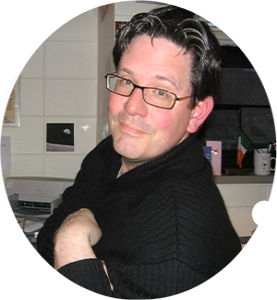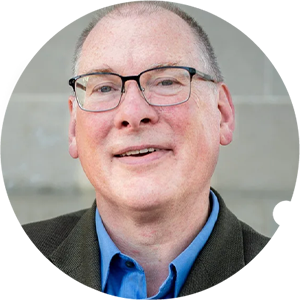Patrick Hicks: First of all, congratulations on the publication of The Leave-Takers. It’s a phenomenal story about love, addiction, and loss. You’ve set your second novel in Clark, South Dakota, and you do a great job capturing rural life in a “flyover state”. Why Clark, though? And more broadly, what relationship does place have with character?
Steven Wingate: Place has every relationship possible with character. I like to tell my students that “Nothing happens nowhere,” because even if you’re writing in an unidentified place, your characters come from a place that has shaped them. Here in “flyover” country, if someone comes within two feet of you on the sidewalk they are fully inside your privacy bubble. In New York, two feet is giving you tons of space. In Hong Kong (where I’ve been), I’m not sure there even is a privacy bubble. Geography shapes how our characters interact with the world, and if we imagine them well, we know this about them. The author’s background obviously also comes into play, shaping what we notice and portray. So by the time fictional characters get to readers—who are also shaped by their geography—they’re a nice, thick stew of relationships with place.
I’ve never lived in Clark. I first encountered it driving by, and it intrigued me because it stood out among many small (population 1000) towns across South Dakota as having a sense of its own personality. So I went back to it many times and started to populate it in my imagination, thinking of it as the town where Jacob and Laynie lived and looking around for places they’d like—and inventing them if I needed to. Since I’m writing fiction rather than nonfiction, I see the physical place itself as a set of cues to spur my imagination rather than a set of details I need to get right. So I’m highly rooted in place as a writer, but not untethered in how I represent it.
PH: There is a rich cast of interesting characters threaded throughout the story. Ironically, most of the main characters are not, in fact, from South Dakota. I’m intrigued by Don-o, who is clearly influenced by eastern religion and has an enormous gong in his barn. He’s also keen on throwing Chinese coins in order to divine the future of his friends. He’s focused on the future while Jacob and Laynie are mired in the past.
SW: I don’t have as much insight into people from South Dakota as I do into transplants, which describes most of the people I know. Outsiders are undeniable part of this region’s life, and it’s important to me to represent the transience of this place as I experience it. Don-o is one of my favorite characters ever. He exudes no-bullshit optimism. He doesn’t back away from the struggle of life, and nothing knocks him over. He’s just a supremely solid guy who stays within himself and keeps moving deliberately through the world. I have no idea where he came from and can’t think of any models for him in my personal history. Maybe he’s a self I want to grow into who doesn’t get caught up in the ups and downs of the creative life. Is it okay to say that I want to grow up to be like him, even though he’s younger in the novel than I am in real life?
PH: Beyond Don-o, it’s clear that superstition, ritual, ghosts, and mysticism are very much a part of the story. These aren’t necessarily topics that you’d associate with farming communities on the Great Plains, but like anywhere else in the world they’re part of daily life. What was it like writing about South Dakota? You’re not originally from the state, so what was it like to bring it to life on the page?
SW: I’ve lived in South Dakota for a decade, but not being from here I have lots of liberty in writing about it. I don’t have to represent an “us” group—South Dakotans or Midwesterners, say—and that’s incredibly freeing. I can write the world as I see and feel it. And because it’s fiction, I can write the world as I wish it, too. There’s definitely an aspect of that in The Leave-Takers, because I’d love it if my little corner of South Dakota had more mystics, dreamers, poets, and artists. I’d give the tip of my pinky for a group people I can do t’ai chi with, or who share my interest in ancient religions. A psychoanalyst might say I’ve planted a few imaginary mystics in South Dakota to compensate for what I don’t have, and they wouldn’t be wrong.
PH: Jacob is an artist who works with metal, and he’s influenced by eastern art, specifically Japanese wood firing. It seems that whenever Jacob isn’t using drugs, he turns to art—he is noticeably sober when creating something. Art and pills are ways to cope with reality in The Leave-Takers. Maybe you could talk about that?
SW: The relationship between art-making and addiction feels extremely clear to me. I grew up with addiction all over my father’s side of the family, and in all honesty I’ve got a “low-calorie” version of the addiction gene myself. I can write characters like Jacob and Laynie because I’ve been around them and have struggled with substances myself. My struggle hasn’t been the life-or-death wrestling match that other men in my family had, but not a day goes by that I don’t think about how what I put in my body alters me.
The addiction dynamic—the unfillable void in the self—can also be addressed by art-making, and I’m lucky to have it as an outlet. I wonder how many people became addicts because they didn’t find (or didn’t give themselves permission to pursue) a creative life. Writing this novel has actually helped me become more aware of the way art fills the void that addiction might otherwise have filled completely. Better to be addicted to writing, as lonely and frustrating as it may be, than addicted to something that could kill me.
PH: I’m struck by the fact that Jacob and Laynie are very much in the shadow of their dead fathers. Jacob almost hates his father while Laynie idolizes hers. There’s a duality here. I’m also aware that she comes from California and Jacob grew up on the East Coast. They act as counterparts for each other.
SW: Ultimately our characters are aspects of ourselves distilled into their essence and given life as full people. As Raymond Carver puts it, “You are not your characters, but your characters are you.” I’ve had a dead father since I was ten, and I know that shadow so well that I don’t even want to write about dead or absent fathers anymore. I’m tapped out. If I see them coming in a fresh work of fiction, I turn the other way.
In their relationships with the dead, Laynie and Jacob are both parts of me, a yin and yang of attitudes flowing back and forth into each other. Part of my job is to give them both an internal, back and forth flow of their own that’s independent of mine. That way they each have their own duality for me to work with. For example, Jacob not only hates but also idolizes his father; the idol he makes is diabolical, but it’s an idol nonetheless. Laynie flows back and forth between clinging to the dead and letting them go. If I don’t feel a character’s duality as separate from my own—though of course shaped by my own—then I can’t write them. But when I do feel their duality, then I know I have to write them.
PH: This book is about a journey—a physical journey of leave-taking and also an emotional journey. Laynie and Jacob are like magnets: sometimes they attract each other, and other times they repel. Maybe you could talk about the genesis of the story. How did it come to you?
SW: My characters come to me in bits and pieces. Jacob first showed up on a cross-country drive when I saw an abandoned barn that looked ready to fall over. I pictured a man gently pushing against it to see how little force he needed to topple it, but I didn’t know what to do with him. Laynie came to me in a California donut shop, when I swore I saw a woman in a veil. (It turned out her hair had fallen into her eyes.) Eventually she came into my imagination again, touching her hands to a sculpture that looked exactly like her own face. When I saw that, I thought “Oh, the guy trying to push over the barn is the one who made that face.”
So the novel was born at least five years before I started to write it. This is the most fascinating thing for me as a writer: how things come into our imaginations and germinate there until they have to sprout, then become unstoppable. We imagine characters who resonate with own psychic material, and some of them keep drawing ever more of that material toward them. Like black holes, I guess. Characters who don’t exist end up becoming repositories of everything we feel, see, learn, and wonder about. Every character we develop is simultaneously a rabbit hole into the self and into the world. It’s rewarding and (to reference our conversation above) highly addictive.
PH: I don’t want to give away the ending, but I do want to say that it threads everything together very nicely. It feels, as WB Yeats would say about an excellent poem, that it has the “click of a well-oiled lock.” The last chapter is called “Things They Couldn’t Know” and you detail the future lives of Laynie and Jacob. You allow the reader to see into their future, but deny it to them. Most of the final paragraphs begin with the phrase, “They couldn’t know…” When did this narrative trope come to you? And what affect does it have on the reader? It’s a brilliant device.
SW: There’s a difference between the end of our characters’ tales and the end of what we want to tell readers about them. I wanted to show Jacob and Laynie’s future without having to pull the reader (or myself) through all the time it takes to get there, step by step. This device lets me glimpse a few key facts about where they’re heading in an economical way. I felt no need to cover the next two decades of their lives with the same scrutiny I used for the bulk of the novel, but instead wanted to step back and watch from afar while they rode off into the sunset. By the time they get to that last chapter, they’ve shown they’re willing to make the sacrifices necessary to make a marriage last. I want readers to have the same feeling I did at novel’s end: that Jacob and Laynie are going to be okay. They’ve paid the price to become who they are, and have achieved a hard-earned peace that looks forward and not back.




